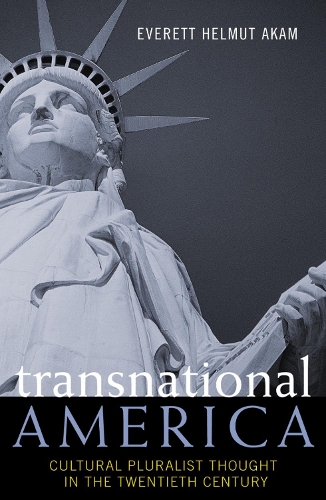
Transnational America: Cultural Pluralist Thought in the Twentieth Century
(Paperback)
Publishing Details
Transnational America: Cultural Pluralist Thought in the Twentieth Century
By (Author) Everett Helmut Akam
Bloomsbury Publishing PLC
Rowman & Littlefield Publishers
20th August 2002
United States
Classifications
General
Non Fiction
Cultural studies
305.800973
Physical Properties
Paperback
240
Width 148mm, Height 228mm, Spine 14mm
318g
Description
The "melting pot" is one of the most cherished images in US culture, but does it really tell the whole story Too often there is tension between the sense of American community and the demands of American diversity. The uniqueness of the many American ethnicities provides the roots of identity, yet recognizing those differences often makes Americans feel isolated from the whole. In this discussion, Everett Akam relies on the neglected tradition of cultural pluralism to argue that unity and individuality are not mutually exclusive. In fact, each is a vital source of American identity. He demonstrates that Americans need to acknowledge that they share much in common as Americans, while never forgetting that what sets them apart forms as great a part of who they are.
Reviews
Well organized. Recommended. . . . Excellent for graduate students and above. * Choice Reviews *
Looking to a neglected past, Everett Akam offers a richer perspective on the tensions between diversity and community than that afforded by contemporary 'identity politics' and its critics. Carefully recovering the insights of an earlier generation of 'cultural pluralists,' he evokes a compelling vision of difference within unity which promised an American identity that averted the perils of both stifling homogeneity and divisive separatism. -- Robert Westbrook, professor of history, University of Rochester; author of John Dewey and American Democracy
Akam weaves a fascinating thesis from the diverse strands of thought in our European/colonial/frontier development. Questioning why we have not created a transnational culture and insist on some form of isolation or absorption, he clarifies some of the major conceptual problems we share today. A brilliant analysis of our society as a quasi-culture. -- Vine Deloria Jr., author of Red Earth, White Lies: Native Americans and the Myth of Scientific Fact, God is Red: A Native View of Religion, and many others
Confounding the standard academic division of labor, Akam blends the intellectual histories of pragmatism, ethnicity and race into a highly original synthesis organized around the concept of cultural pluralism. Rejecting both tribalism and universalism, he calls for an ideal of diversity in unity that respects the irreducible particularity of distinct cultures while still maintaining a common national culture capable of uniting people across their local cultural communities. Akam's powerful, concluding tribute to the Civil Rights Movement as the most significant, if short-lived, historical embodiment of this pluralist ideal should serve as the starting point for all future discussions of multiculturalism in America. -- Christopher Shannon, author of A World Made Safe For Differences: Cold War Intellectuals and the Politics of Identity
This book is most valuable for its examination of Locke in context. * Journal of American History *
Akam's Transnational America captures better than any previous work the philosophical aspirations of the early-twentieth century cultural pluralists. Bourne, Kallen, Collier, and Locke emerge here not only as critics of the 'melting-pot ideal,' but as thinkers engaged with the most vital issues of modernity. Their inquiry into the nature of truth, values, selfhood, and community in a pluralistic universe has much to offer the contemporary debate about ethno-racial diversity and U.S. national identity. There's wisdom in this book. -- Casey Nelson Blake, Columbia University
Author Bio
Everett Helmut Akam is professor of history at Casper College.
